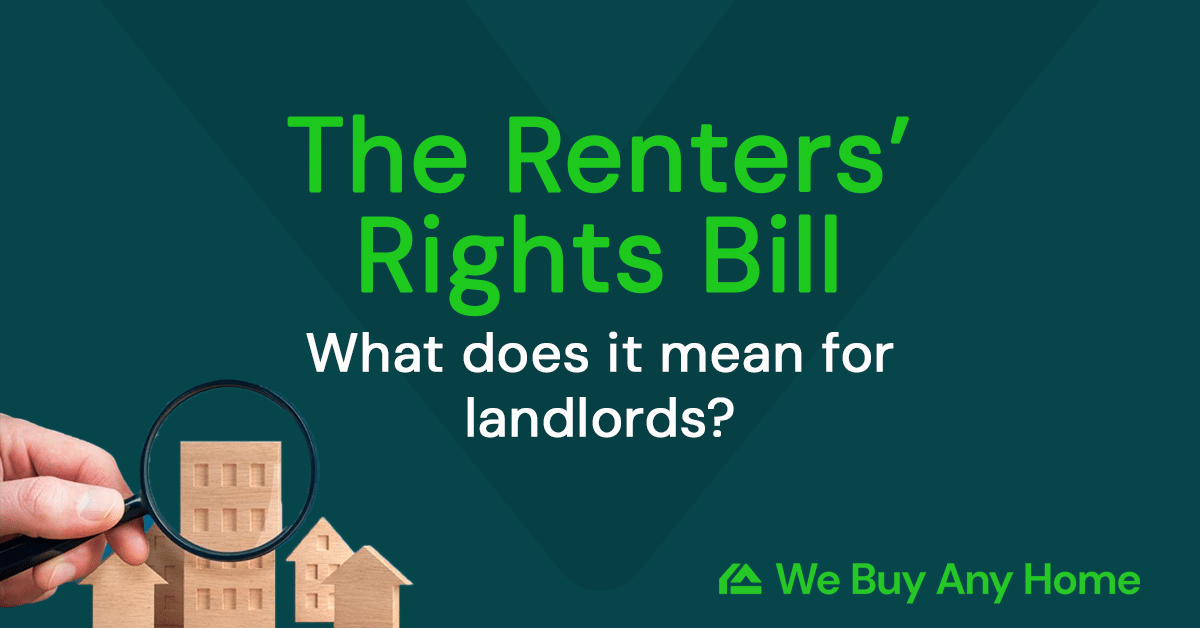Sell A Tenanted Property
We’ve bought hundreds of buy-to-let properties.
- FREE cash offer within minutes
- Receive funds in 7 days
- A guaranteed sale on any property

Navigate regulations with ease. We streamline landlords’ selling process.
Sitting tenants complicate viewings and negotiations, which can delay and derail sales.
Fortunately for landlords, We Buy Any Home provides a streamlined and efficient solution.
Our experienced team of industry experts have bought many buy-to-let properties.
We can provide you with a smooth, fast sale that respects the rights of your tenants.
We take the stress out of selling tenanted properties.
Free cash offer within minutes, any condition, any location.





Why sell a tenanted property?
-
Section 24 Landlord & Tenant Act
-
Increased regulations
-
Releasing locked capital
-
EWS1 issues
-
Difficulties of being a landlord
This legislation prevents landlords from deducting mortgage interest and other costs from rental income before tax.
It has left many landlords out of pocket and eager to sell.
We help you navigate this with ease, to unlock your capital and regain financial flexibility.
Section 24 Landlord & Tenant Act
This legislation prevents landlords from deducting mortgage interest and other costs from rental income before tax.
It has left many landlords out of pocket and eager to sell.
We help you navigate this with ease, to unlock your capital and regain financial flexibility.
Increased regulations
Increased regulations have lowered profits from renting out property.
For example, landlords must now meet stricter requirements for:
- Energy efficiency
- Electrical certifications
- Selective licensing.
Releasing locked capital
Many landlords choose to sell rented properties to free up their investment.
This might be to get out the industry altogether or to diversify some of their investments away from it.
EWS1 issues
The Grenfell Tower fire in 2017 changed regulations.
Formal safety reviews are now mandatory under certain conditions.
For example, for buildings with cladding or over a certain height.
If you own a leasehold on a tenanted flat, cladding issues can make selling difficult.
The freeholder of the building may not be willing to pay for the safety review. Or they may charge you to complete it.
The situation can be worse if the property you own is in a council-owned building.
Councils are rarely willing to incur costs that benefit private leaseholders.
We Buy Any Home buy with our own funds, so we can buy flats with these issues.
Regardless of your reason for selling, we can purchase buy-to-let properties in as little as 7 working days.
Difficulties of being a landlord
Being a landlord isn’t easy.
There are many admin and other kinds of tasks to deal with, including:
- Promptly fixing problems for tenants
- Maintaining a sinking fund for unexpected issues
- Carrying out inspections
- Ensuring tenants are well-behaved (on behalf of neighbours).
Many of these tasks can be carried out by a property management company. However, this comes at a cost.
The end result can be a lot of stress gained and time lost managing properties.
Difficulties in selling tenanted property
Prospective buyers usually want to view properties before making offers.
Opening the property to viewings can breach the tenant’s right to quiet enjoyment.
Your agreement might prevent you from conducting viewings without tenants’ permission.
At We Buy Any Home, we don’t require viewings to purchase your property.
We handle all the complexities, so you don’t have to.
Viewings
Prospective buyers usually want to view properties before making offers.
Opening the property to viewings can breach the tenant’s right to quiet enjoyment.
Your agreement might prevent you from conducting viewings without tenants’ permission.
At We Buy Any Home, we don’t require viewings to purchase your property.
We handle all the complexities, so you don’t have to.
Refurbishments
Before selling, many homeowners renovate, re-decorate and stage their home.
Landlords are limited – all work requires permission and planning around tenants.
At We Buy Any Home, we buy homes in any condition.
You don’t have to worry about the logistics of repairs, refurbishments, etc.
We can buy the property directly from you, with tenants in situ.
Terminating an agreement
Selling properties with tenants on the open market takes control away from sellers.
Finding another landlord to sell to is difficult.
Ordinary buyers will often require your tenants leave.
The time this takes dependents on the terms of the tenancy agreement. A long notice period could make sales fall through.
At We Buy Any Home we can offer a guaranteed sale for tenanted properties.
We won’t require you to end the tenancy. This means you don’t have to negotiate with or disturb your tenants.
Popular Areas We Service
We operate across the United Kingdom, including England, Scotland, and Wales.
Free cash offer within minutes, any condition, any location.
Don’t just take our word for it.
View more reviewsHighly Recommend for No Stress
Daisy and Chelsea were great, I have been having a really hard time selling my house on the open market and couldn't deal with the stress anymore. I came to WeBuyAnyHome just to explore my options but it turned out to work out really well for me. What they offered to start with did slightly change but that was fine as they were transparent in the process. I received my money within 3 weeks of making the first call and I can finally move on with my life. Thank you ladies you have helped me a lot.
Grateful for We Buy Any Home
Very knowledgeable and hard-working team. Tom and Chelsea are very professional and supportive at all times and provided updates throughout the process to keep you in the loop. Appreciate the help the company gave in a time of need.
Can I sell my tenanted property?
-
Sell your property to an ordinary buyer
-
Sell your property to another viable landlord
-
Selling a property with problem tenants
You can also sell a tenanted property to an ordinary buyer who will live there once the sale is completed.
Previously, if you had an Agreed Shorthold Tenancy agreement (AST), you could serve your tenants a Section 21 notice.
However, with the Renters’ Rights Bill, ASTs are no longer valid. To remove a tenant, you must give a fixed notice period of 4 months and you cannot re-let the property for 12 months after their eviction.
If you are able to find another landlord looking to buy, you can sell to them.
Your tenants won’t need to move out. Your tenancy agreement can be transferred to the new landlord.
The new landlord must honour the existing terms for the remainder of the tenancy.
So, you won’t lose income in the lead up to the sale.
Some landlords want to sell their buy-to-let properties because of problem tenants.
These tenants may refuse to let prospective buyers enter the property.
Or they might have left the property in bad condition.
At We Buy Any Home, we purchase properties with problem tenants.
And we will also buy your property no matter what the condition.
Sell your property to an ordinary buyer
You can also sell a tenanted property to an ordinary buyer who will live there once the sale is completed.
Previously, if you had an Agreed Shorthold Tenancy agreement (AST), you could serve your tenants a Section 21 notice.
However, with the Renters’ Rights Bill, ASTs are no longer valid. To remove a tenant, you must give a fixed notice period of 4 months and you cannot re-let the property for 12 months after their eviction.
Sell your property to another viable landlord
If you are able to find another landlord looking to buy, you can sell to them.
Your tenants won’t need to move out. Your tenancy agreement can be transferred to the new landlord.
The new landlord must honour the existing terms for the remainder of the tenancy.
So, you won’t lose income in the lead up to the sale.
Selling a property with problem tenants
Some landlords want to sell their buy-to-let properties because of problem tenants.
These tenants may refuse to let prospective buyers enter the property.
Or they might have left the property in bad condition.
At We Buy Any Home, we purchase properties with problem tenants.
And we will also buy your property no matter what the condition.
Here you will find the latest UK property
news, as well as industry tips and advice.









Free cash offer within minutes, any condition, any location.
Get a free cash offer today
Enter your details below
"*" indicates required fields









